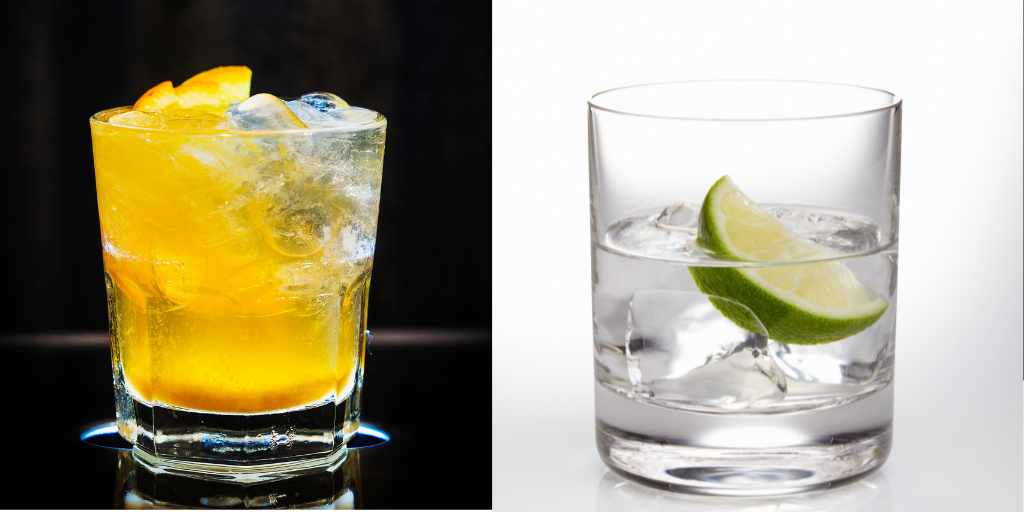Is it gin o’clock yet? Or perhaps you’re more of a vodka aficionado, sipping on a cosmopolitan? Regardless of your preference, the world of gin and vodka offers many intriguing flavours, cocktail combinations, and historical tales. But, are gin and vodka the same? Unravel the fascinating history of these two beloved spirits and discover their unique qualities, from their core ingredients to their distillation processes and flavour profiles. Let’s embark on a spirited journey of discovery!
Key Takeaways
- Gin and Vodka have distinct histories, core ingredients, distillation processes, flavour profiles and alcohol content.
- Classic cocktails can be made with either spirit at different temperatures to emphasize their unique flavours.
- Both offer health benefits as well as a range of varieties for exploration according to individual preference.
Gin and Vodka: A Brief History
The origins of gin and vodka tell the stories of two distinctive spirits that have traveled the world and captivated taste buds. Gin is believed to have been invented by Johannes van der Does in the early 1600s in the Netherlands. Its unique flavour, derived from juniper berries and other botanicals, made it a popular choice for a variety of gin cocktails in Britain during the 1700s. Meanwhile, vodka’s roots trace back over a thousand years to Russia and Eastern Europe, eventually gaining widespread popularity in America after World War I.
Despite their different origins, gin and vodka shared a common purpose during the cold British winters of the 1700s: to keep people warm. Both spirits found their way into the hearts and glasses of many, even as their flavours and characteristics evolved.
Presently, gin and vodka maintain their stature as some of the world’s most beloved spirits, both providing a distinctive tasting experience.
The Core Ingredients
While gin and vodka may appear alike in a glass, their core components showcase their stark contrast. Gin’s signature flavour comes from juniper berries, which are complemented by an array of botanical herbs and spices such as:
- lavender
- citrus peel
- anise
- coriander
- angelica root
- cardamom
This delightful combination of natural ingredients, including lemon juice, lends gin its unique and aromatic profile.
Conversely, vodka is known for its more neutral taste, typically crafted from mashed potatoes or grains like sorghum, corn, rice, rye, or wheat, which contain fermentable sugars or starch. This subtle flavour profile makes vodka incredibly versatile, making it a popular base for countless cocktails and infusions.
The Distillation Process
While both gin and vodka undergo a fermentation process, their distillation methods set them apart. Gin’s unique flavour comes to life during distillation, when juniper berries and botanicals are added, infusing the spirit with their essential oils and aromatic properties. This process imbues gin with its distinctive piney taste and intriguing complexity.
Vodka’s distillation journey is focused on achieving purity and neutrality. Distilled multiple times and filtered through charcoal or activated carbon, vodka emerges with a clean, smooth mouthfeel, devoid of any distinct flavors or impurities. This purification process allows vodka to serve as a versatile canvas for mixologists to create an endless array of cocktails.
The decision between gin and vodka is ultimately a matter of personal taste, given that each spirit delivers a distinct tasting experience. Whether you’re captivated by gin’s complex flavors or drawn to vodka’s subtle versatility, both spirits hold a special place in the world of mixology.
Flavour Profiles: Gin vs. Vodka
Gin’s flavour profile is characterized by the strong, piney taste of juniper berries, accompanied by a symphony of floral, herbal, and citrus notes. This rich, complex profile sets gin apart from other spirits, making it a favourite among those who appreciate its unique botanical characteristics.
In contrast, the subtle and neutral flavour of vodka, including flavoured vodka, enables it to mix effortlessly with a variety of ingredients, such as:
- fruit juices
- sugar syrup
- soda water
- tonic water
- ginger beer
The neutral spirit base of flavoured vodka allows for this versatility in mixing.
This versatility has made vodka popular for those seeking a more adaptable base spirit for their cocktails.
Whether you’re sipping on a classic gin and tonic or a refreshing vodka sour, the flavour contrast between these two spirits caters to a wide range of taste preferences.
Alcohol Content Comparison
In terms of alcohol content, gin and vodka bear considerable resemblance. Gin’s alcohol by volume (ABV) typically ranges between 36% to 40%, while vodka’s ABV hovers around 40%.
Although their alcohol contents may be comparable, each spirit’s unique flavours and characteristics continue to set them apart, offering discerning drinkers a diverse selection to suit their preferences.
Classic Cocktails: Gin and Vodka
For gin enthusiasts, the classic gin and tonic or a sophisticated, classic martini never go out of style. The aromatic flavours of juniper berries and botanicals shine through when paired with tonic water or vermouth, creating iconic gin cocktails that have stood the test of time. Other gin-based classics like the Tom Collins, the Negroni, Gin Fizz or a refreshing tom gin showcase the spirit’s versatility, with fruit juices and bitter ingredients beautifully complementing its unique profile.
Vodka’s adaptability makes it the star of countless classic cocktails, including:
- Moscow Mule: a refreshing blend of vodka, ginger beer, and lime
- Vodka Martini: immortalized by James Bond’s famous preference for it shaken, not stirred
- Bloody Mary: a savoury mix of vodka, tomato juice, and spices, perfect for brunch or a late-night pick-me-up
Whether a gin devotee or a vodka enthusiast, classic cocktails present infinite opportunities to discover and relish these two adaptable spirits. So, next time you’re at the bar, why not raise a glass to the storied history and unique flavours of gin and vodka?
Serving Suggestions
Although gin and vodka are versatile in their enjoyment, their serving recommendations underline the primary distinctions between them. Vodka is typically served chilled straight from the freezer or over ice, providing a smooth and refreshingly crisp drinking experience. This cool temperature helps soften lingering flavours further, making it the perfect base for a wide array of cocktails.
Conversely, gin is often served closer to room temperature, allowing its intricate botanical flavours to express themselves fully on the palate. Whether enjoyed neat, over ice or combined with tonic, gin’s unique flavour profile is best savoured when served at the right temperature.
Personal preference significantly influences how you enjoy your gin or vodka.
Health Benefits and Considerations
Acknowledging the importance of responsible drinking, moderate consumption of both gin and vodka presents certain health benefits. Thanks to its juniper berries and botanical ingredients, gin contains antioxidants and anti-inflammatory properties.
Vodka, on the other hand, is a source of antioxidants, potassium, and vitamin B6. So, whether you’re sipping on a gin and tonic or a vodka cocktail, you can enjoy some guilt-free pleasure, knowing that you’re indulging in a little bit of liquid wellness.
Personal Preference: Neat or Mixed?
Choosing to savour gin or vodka neat or mixed is largely a matter of personal taste. For some, the complexity of gin’s botanical flavours is best appreciated when sipped neat or combined with minimal mixers like tonic water. Others may prefer vodka’s versatility, which allows it to effortlessly blend with various ingredients and flavours, creating a wide range of cocktails to suit any taste.
So, whether you’re drawn to the bold, piney notes of gin or the understated neutrality of vodka, there’s no wrong way to enjoy these two popular spirits. The world of gin and vodka is as diverse as the drinkers who love them, offering endless opportunities for exploration and enjoyment.
Varieties of Gin and Vodka
Mirroring the varied preferences of drinkers, gin and vodka are available in numerous forms, catering to a spectrum of tastes. Gin enthusiasts can choose from London Dry Gin, Old Tom Gin, and Navy Strength varieties, each offering a unique take on the spirit’s signature juniper and botanical flavours.
Vodka lovers have many options, including Potato, Grain, and Flavored varieties, providing diverse flavours and textures to suit any palate. With such a wide array of options, the world of gin and vodka is truly a playground for those seeking new experiences and flavours.
Summary
In the spirited world of gin and vodka, it’s clear that these two popular spirits offer a wealth of history, unique flavours, and endless possibilities for enjoyment. From their distinct origins to their contrasting flavor profiles, gin and vodka cater to a diverse range of tastes and preferences. Whether you’re sipping on a classic gin cocktail or experimenting with vodka’s versatility, there’s always something new to discover and savour. So, raise your glass and toast to the timeless allure of gin and vodka, and the many ways they continue to captivate our taste buds.
Frequently Asked Questions
What is the difference between gin and vodka?
Gin is distilled with juniper berries, giving it a distinctive flavour and smell. At the same time, vodka can be made from various ingredients, usually potato-based, and has little to no flavour or odour.
Is gin based in vodka?
Gin is distinct from vodka because it always contains juniper berries, providing a signature pine flavour. While vodka can be used as an ingredient to prepare gin, other botanicals, such as angelica root and lemon, are also used to create the final product.
Is gin stronger than vodka?
Gin and vodka are both required to have no less than 40% ABV, and one is not stronger than the other. Botanical flavours in gin can help tone down the strong flavours of alcohol.
Can you use vodka instead of gin?
Yes, you can use vodka instead of gin in many cocktails, such as Martinis and Vodka & Gin and Tonics. Vodka is a neutral spirit that is a substitute for other clear spirits like gin, silver rums and tequilas, and even whiskey in some drinks.
How does the distillation process differ between gin and vodka?
Gin is distinctively flavoured with botanicals during distillation, whereas vodka is distilled and filtered multiple times for purity.




